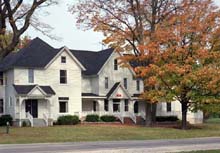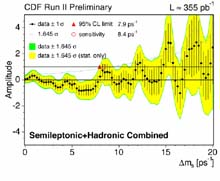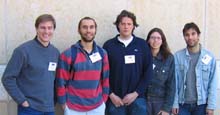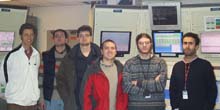 | Thursday, March 17, 2005 |
|
Thursday, March 17 Happy St. Patrick's Day! 2:30 p.m. Theoretical Physics Seminar - Curia II Speaker: C. Oleari, Universita Milano Title: QCD Corrections to Higgs Boson Production: Signal and Backgrounds 3:30 p.m. DIRECTOR'S COFFEE BREAK - 2nd Flr X-Over 4:00 p.m. Accelerator Physics and Technology Seminar - 1 West Speaker: S. Schreiber, DESY Title: TTF VUV FEL Commissioning
Friday, March 18
Sunday, March 20 |
|
Extended Forecast |
Secon Level 3 |
|
Thursday, March 17 Tomato Florentine Soup Grilled Chicken Cordon Bleu Sandwich $4.75 Chimichangas $3.75 Chicken Marsala $3.75 Maryland Crab Salad $4.75 Italian Sausage Calzones $3.25 SW Chicken Salad with Roasted Corn Salsa $4.75 The Wilson Hall Cafe now accepts Visa, Master Card, Discover and American Express at Cash Register #1.
Wilson Hall Cafe Menu |
| Fermilab Today is online at: http://www.fnal.gov/today/ Send comments and suggestions to today@fnal.gov Fermilab Today archive Fermilab Today PDF Version Fermilab Result of the Week archive Fermilab Safety Tip of the Week archive Linear Collider News archive Fermilab Today classifieds Subscribe/Unsubscribe to |
|
Yesterday's INFN/Fermilab press release listed the wrong affiliation for
Alessio Notari, who is from McGill University.
|
|
March 14- March 16 - During this 48 hour period operations established two stores that provided the experiments with approximately 41 hours and 33 minutes of luminosity - Linac suffered RF and Buncher trips
Read the Current Accelerator Update |
|
FYI: AIP Bulletin of Science Policy News, March 16, 2005 AIP Endorses 7% Increase in DOE Office of Science Budget The American Institute of Physics and two of its Member Societies have endorsed the Energy Sciences Coalition's FY 2006 Funding Statement for the Department of Energy's Office of Science. The coalition statement calls for a 7%, or $250 million, increase in the Office of Science's budget over the current year.
The Bush Administration's request that was sent to Congress in February
recommended a 2.0% reduction in the total Department of Energy budget.
The Office of Science's budget would be cut further: a 3.8% reduction was
proposed. Under the President's request, the budget for the Office of
Science for the fiscal year starting this October 1 would be 2.0% lower
than it was for FY 2004.
|
|
Studying Matter-AntiMatter Transformations with CDF | |||
| |||
|
Mesons are combinations of a quark and an anti-quark bound
by the strong interaction. Due to the electroweak force,
neutral mesons such as the K0 (strange anti-quark and down
quark), the B0 (bottom anti-quark and down quark) and the
B0s (bottom anti-quark and strange quark) can transform
from particle to antiparticle, e.g., B0s to anti-B0S
(bottom quark and strange anti-quark). These transformations
are refered to as "flavor oscillations" since the quarks
become antiquarks and vice-versa. Measuring the frequency
of these oscillations provides information on fundamental
parameters in the Standard Model of particle physics and may
provide a window to finding physics beyond the Standard
Model.
While flavor oscillations were established in the K0 system in 1960, the first evidence for oscillations in the B0 system was reported by the ARGUS Collaboration in 1987. The oscillation frequency, Delta md, has since been measured with a precision approaching 1%. It is known that B0s mesons oscillate, and since the late 80's, attempts to measure the oscillation frequency, Delta ms, have failed. The measurement of Delta ms is one of the most sought after results at the Tevatron. The measurement of B0s flavor oscillations requires exquisite experimental precision to reconstruct the B0s meson decays, to measure their decay time, and to determine whether the meson that decayed was produced as a B0s or an anti-B0s. It is one of the most complex analyses undertaken by CDF, and it includes many supporting measurements such as B meson lifetimes and B0 flavor oscillations. More than 70 physicists (including 24 Ph. D. students) from 25 institutions are involved, making this one of the largest coordinated analysis efforts in CDF's history. The result is shown in the figure above; B0s flavor oscillations are not observed, and a lower limit on Delta ms > 7.9 trillion hertz is established. This means that a B0s meson transforms to a anti-B0s in less than 0.4 trillionths of a second, at least sixteen times faster than B0 oscillations. The expected value of Delta ms in the Standard Model is about 20 trillion hertz. The current CDF result is not the most restrictive lower limit on Delta ms, yet with planned improvements and more data to come, this first result demonstrates that CDF is on the road to measure Delta ms during Run II. | |||
| |||
|
Result of the Week Archive |
|
International Folk Dancing International Folk Dancing has now moved back to the Kuhn Barn on Fermilab's site and will celebrate St. Patrick's Day with some Irish dances on Thursday, March 17. Dancing begins at 7:30 p.m. with teaching earlier in the evening and request dancing later on. Newcomers are welcome and you do not need to come with a partner. Info at 630-584-0825 or 630-840-8194 or folkdance@fnal.gov.
|



